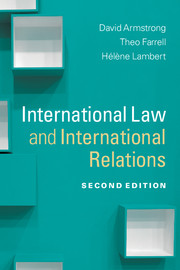4 - Use of force
from Part II - The law in world politics
Published online by Cambridge University Press: 05 June 2012
Summary
The power of international law is severely tested when it comes to the use of force by states. The development of modern international law was spurred on by the quest to eliminate war from world politics. War in the industrial age promised to be more awful than ever before experienced by humankind. And indeed the two World Wars of the twentieth century claimed countless millions of lives and left whole continents in tatters. Hence, the use of force was prohibited in the new United Nations (UN) system. This prohibition is further supported by a larger corpus of treaty and customary international law. The only exceptions permitted under the UN Charter are the use of force in self-defence, and when authorised by the United Nations Security Council (UNSC) for the purpose of protecting international peace and security. Notwithstanding this, states have continued to use force not in self-defence and without UNSC authorisation.
It is clear that law, in itself, is a poor restraint on the use of force by states. This is recognised in the realist lens by the emphasis placed on a functioning balance of power as a necessary enabler for international law to function. Viewed from a narrow perspective, therefore, international law is weak in the face of state power. But viewed more broadly, international law on the use of force clearly captures values in the international community, and provides a discourse on the legitimacy of using force. The first section of this chapter examines the content of the law in this area as rules, values and discourse, and gives detailed consideration to the evolving law on use of force in self-defence and for humanitarian purposes. The next section discusses why states comply, when they do, with the legal prohibition on using force. The formal, policy, and social process of change in law on the use of force are examined in the third section. We conclude by considering the impact of increasing legalisation on the occurrence of war in the contemporary world. It should be noted that international criminal law has come increasingly to concern itself with individual responsibility for the use of force, so some aspects of this issue will also be considered in Chapter 6.
- Type
- Chapter
- Information
- International Law and International Relations , pp. 125 - 162Publisher: Cambridge University PressPrint publication year: 2012



